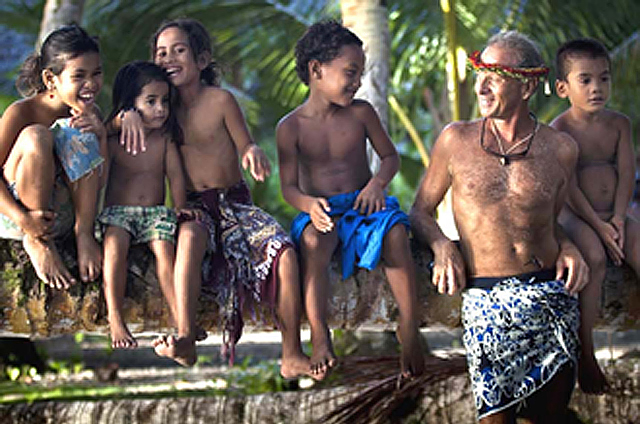Paul Turke, an anthropologist who did field work on Ifaluk Island in the early 1980s, has just shared a few recollections of the islanders in a Psychology Today blog post. He links the pleasures grandparents can derive from helping raise their grandchildren—as the Ifaluk do—to successful human evolution.

He recalls his trip to Micronesia with his wife, also an anthropologist, where she studied the political systems of the Micronesians while he investigated their child care. He published a variety of works subsequently about Ifaluk but he made a career change at age 39, went to medical school, and became a pediatrician.
He sets the scene in his essay by describing Ifaluk when he was there: a small atoll with land barely above high tide—“which makes typhoons an ever-present danger,” he writes evocatively. Roughly 450 people lived there, with about as many pigs, dogs, and chickens. While the men fished, the women worked in their taro gardens and the children played. It impressed him as an incredibly isolated place.
He recalls that the Ifaluk have a saying that “the child is king.” Except for the biting insects, it is an idyllic place to be raised, he suggests. Parents are devoted and loving, and they are assisted in their child-rearing duties by many others—grandparents, uncles, aunts, siblings, other relatives and villagers.
He calls Ifaluk a “kinship society,” one of a dwindling number of places that are quite comparable to the situations in which our ancestors lived. Children were not abandoned by parents who commuted to distant jobs, there were no single parents overwhelmed by the burdens of raising a child, and no children grew up in isolated situations. He calls Ifaluk “a snapshot” of how children used to be raised.
The thrust of his essay is to argue that the kinship networks he witnessed on Ifaluk were important for the reproductive success of the people. Surrounded by loving, caring relatives, the children were secure and happy. He maintains that humans have evolved to count on that kind of support.
But from his own personal experience—having a granddaughter living nearby—Dr. Turke has learned first-hand about the constant pleasures one can derive from caring for, and sharing love with, a child. In other words, it works both ways he has found. Both the child and the grandparent benefit. In essence, having related children nearby, having the opportunity and pleasure of playing with a grandchild, has been a path to happiness for him as well as for the kid. It is clearly a lesson that the Ifaluk are only too well aware of.